Winning In The Purpose Revolution: Meaning Is The Next Frontier with Dr. John Izzo
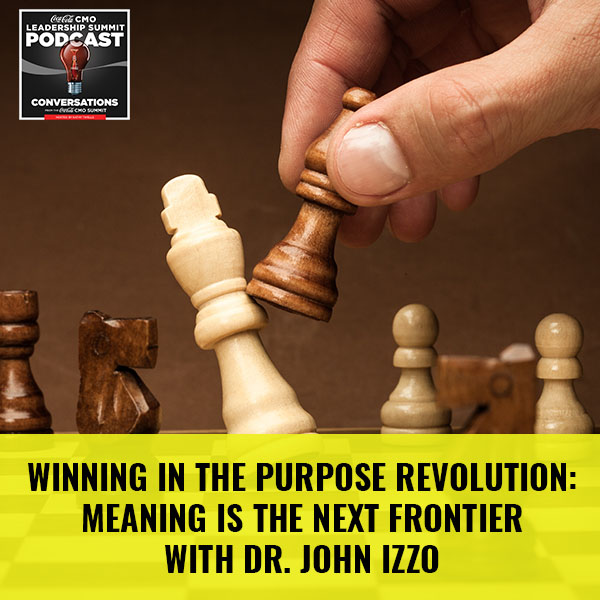
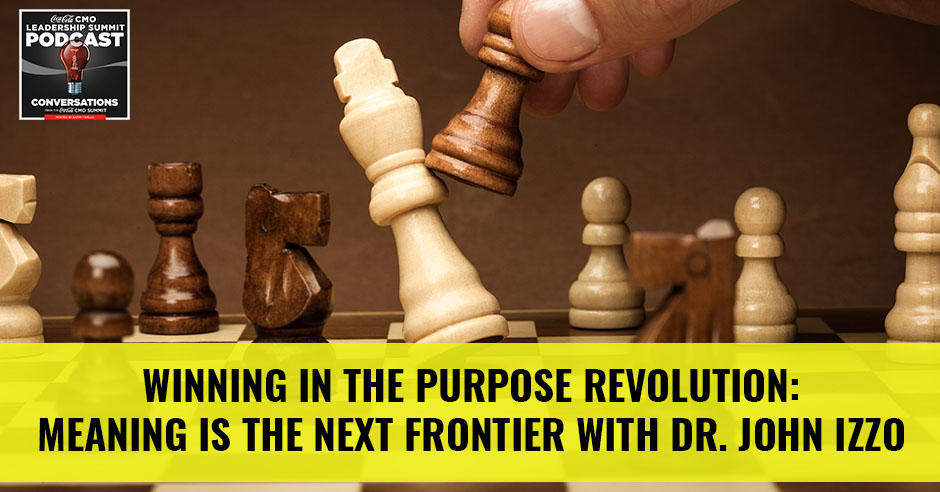
One of the greatest challenges of this age of disruption that we’re in is it’s about speed and technology. However, there’s an old school thing that people are longing for. More than anything else, we’re longing for humanity. If your company can give your team members and your customers that thing that’s missing, you can have a competitive advantage that will be hard to duplicate. You may even find your own humanity in the process. Keynote speaker and leadership expert Dr. John Izzo talks about the purpose revolution and how employees, customers and even investors are asking a different question today. Dr. Izzo says the world is changing and people want meaning, relationship, and authenticity in addition to the product. We’re now marketing our purpose, not our company. In that process, hopefully, we’ll solve the biggest problems the world is facing and give our children and grandchildren a better world than the one we inherited.
—
Listen to the podcast here:
Winning In The Purpose Revolution: Meaning Is The Next Frontier with Dr. John Izzo
This is the full presentation of Dr. John Izzo’s talk titled, Winning in The Purpose Revolution: Meaning Is The Next Frontier from the 2017 Coca-Cola CMO Summit.
—
To ask this question, in an age of disruption of technology that’s changing where we’re told that speed is the key to winning our customers and winning our team members, I want to go a little old school on you. I want to suggest that what we are longing for more than anything else is we’re longing for humanity. What we’re longing for more than anything else, the reason when Brody put up that slide that said objectively, everything is better than it’s ever been in the history of human beings. Only somewhere between 4% and 7% of us think that are true is because something is missing. I want to suggest to you that if your company can give your team members and can give your customers that thing that’s missing, you can have a competitive advantage that will be hard to duplicate. You may even find your own humanity in the process.
I am a PhD, a doctorate. I hope you won’t hold that against me. My 30-year-old daughter always tells her friends, “It’s nothing. He’s the doctor who can’t help anybody.” I want to begin this conversation about what I call The Purpose Revolution in a rather odd and unusual place. My father’s family is from Sicily. I made a visit there this summer. My partner Janice had never been to Mount Etna. We went up to Mount Etna and I happened to find this guy. He’s basically a goat handler. He stands by the volcano with a goat, with a basket for you to hopefully put money in, and these little tiny stones..Having studied Blue Ocean and Red Ocean, I thought, “You don’t get much more Red Ocean than this.” A bunch of people standing around with their animals, “Will you take a picture with my animal and give me some money?” As soon as I arrived, I realized this guy is surrounded by people. Everyone wants their picture taken with his goat and his basket is filled with Euros.
I watched him for a few minutes. It took me only a couple of minutes to know why he was Blue Ocean in which surely should have been Red Ocean. What I noticed was, yes, he was friendly, yes, he served the customers, but he had a purpose that was visible. He wasn’t standing there with the goat for money. He wanted to make you feel better about the world because you were there. Here’s how I know that’s true. At the end, after I put my money in and I had my picture taken, I had already walked away when he said, “No, stop.” He reached down and took these little volcanic rocks in which he has these two plastic lady bugs that he glues on there that stare at you like two eyes. He said, “You’ve forgotten this.” Mind you, I’ve already put the money and he said, “You’ve forgotten this. This is so you will remember what a blessing life is. Please take this home with you.”
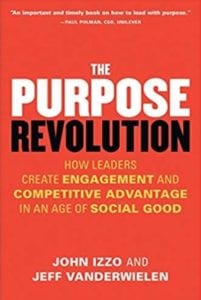
The Purpose Revolution: How Leaders Create Engagement and Competitive Advantage in an Age of Social Good
As silly as that story is, I believe it tells us something about this emerging Purpose Revolution. I’ve been writing about this for a long time. I’m not a Johnny come lately to this conversation. I wrote a book in 1994 called Awakening Corporate Soul, long before hardly anybody was saying that doing good was good business. In 2000, I met a few people who were saying, “The millennials are a little funny. They want different things.” I wrote a book called Values Shift and say it’s not just about millennials, all of the society is shifting in terms of how we see work and what we want from it, and the book, The Purpose Revolution.
We’re Asking Different Questions
We are asking some different questions and those questions change everything about how we win customers. Let me illustrate with a story. There’s a man named John Replogle. He was the CEO of Guinness in North America. It’s a great company, especially if you like a good stout. He has his life on a string. He’s living in a beautiful home in suburban Connecticut outside of New York City. He’s literally climbing up the ladder. He’s making a lot of money. He’s got a great family, great friends. Everything is going well until a mentor of his says, “John, I think it help you if you wrote a personal mission statement. A statement about what you saw as the mission of your life.” John said, “I’ve been working on it for weeks, but I couldn’t make any traction.
I had no idea what my personal mission statement was. I knew what my business purpose was. I knew what my business life was about.” He said, “One day I’m on my way to work. I’m running late. I’ve got my two young kids strapped in the seat belts in the backseat of the car. I look in the rear view mirror before I pull out of the driveway and I somehow catch both of them looking at me in the rear view mirror. I thought to myself, “Everything I have done in my career to this point has been for myself. Nothing I have done in my career so far will make the world that they live in better than the world I inherited.” Literally as he sat in his driveway, he started to cry because he said, “I realized it wasn’t enough.”
Here’s the interesting thing about The Purpose Revolution. All over the world, employees, customers, and even investors are asking a different question. They’re asking the same question they always asked before. “If I worked for you, I want a good job and a career ladder. I want to have fun. I want to grow. I don’t want to be micromanaged. If I buy from you, I want good food at a good price that tastes good,” but they’re also asking for something else. If they’re an employee, they want most of all to know they matter. I know people are tired of talking about the millennials, Gen Z, and all of this. Most people do not understand the millennials because what they don’t understand is what matters most to the millennials is to matter.
50% of millennials globally say they would gladly take a pay cut to work for a company or in a job that had meaning for them, where they felt they could make a difference. I said that recently at a session like this, a Gen X executive said, “That’s this thing that millennials say on survey.” There was a thousand people in the room. I said, “Every millennial, standup,” and 110 millennials stand up. I say, “Millennials, here’s the deal. If already in your career you have made a decision who you work for, who you wouldn’t work for, whether you give your energy at a project or not giving energy to it because of purpose. You thought you could make a bigger difference somewhere than where you were, stay standing. If you haven’t done that yet, sit down.” Eight of the 110 of them sat down.
The Three Divides
What about our customers? Our customers are asking different sets of questions and by the way, it’s and, it’s not or. I’ll talk about what we know about what customers are saying, but here’s the thing. Our customers have two things in their mind that drive them to think about the purpose of our organization. The first thing they’re thinking about, what my friend Otto Scharmer at MIT calls the three divides. Why in spite of all of these statistics about how the world is better, do most of us think the world isn’t better? The three divides that Otto talks about explain it. First there’s the eco divide. How many of you would agree with me? The course we’re on in terms of how we’re treating the planet is probably not sustainable for our children and grandchildren. There’s the eco divide all over the world. People are saying, “I don’t think this is sustainable. It looks good. It’s like a Hollywood set, but if we push it down it’s not working.
There's got to be more to life than simply getting a paycheck. Share on XThe second thing is the social divide. There’s the obvious thing about the social divide, the growing divide between the rich and the poor, Brexit, Trump, all result to some extent of increasing numbers of people in the developed world feeling that they’re left behind. There’s another part of the social divide which is the sense that I buy this product and I ask myself, “What harm did I do to the world in buying this product?” The third is what Otto calls the spiritual divide, which is a loss of meaning. A loss of connection is what Prince Ea Richard was talking about in his video. The sense that, “I’ve got all these friends and all this stuff going on in the virtual world, but my real sense of community and connection, my real sense of connection to other human beings that is missing.” Maybe there’s got to be more to life than simply getting a paycheck.
With all of that conversation going on inside of us, we basically want to do two things. First of all, we want to consume without guilt. We want to make sure we check all three of the things we might feel guilty about. First of all, “Is this food I’m eating good for me?” That’s the first level of guilt. “Am I harming myself?” Second level of guilt is, “I wonder what harm I did to the planet in the process of buying this product?” Number three, “I wonder what harm I did to other people in the process,” but then I’ll flip that over to the aspiration. “I wonder what good I could do in my work or in the products that I buy?” If you dealt with how important this is for a moment, we talked about some of the technological shifts over the last couple of decades.
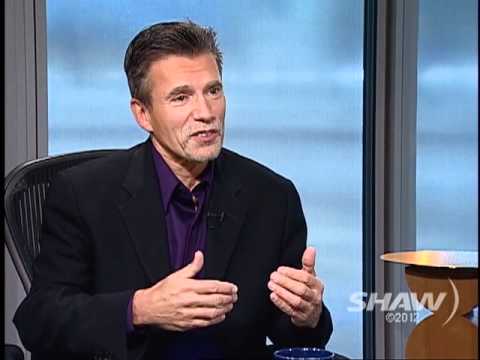
Purpose Revolution: We want to consume without guilt.
The Good Life
Think about some of the shifts in the value space that are going on. First of all, from pretty much the good life being defined as how much you got and how high you went up the ladder to the most recent Harris survey. Americans and Europeans are pretty much uniform. Democrat, Republican, Right, Left, Conservative, Liberal, the good life is balanced simplicity and connection. We want enough money that we can live the life we want to live, but we want it balanced by a sense of family, a sense of community, a sense of connection, and a sense that we have life that’s bigger than the money that we make. We trusted institutions. You guys spent a lot of time trying to convince your customers how good you are.
It should depress you that they only believe about 16% of what you say. I love the new video by Coca-Cola, but even the greatest marketers in the world must understand the average person. What we know from the statistics, there’s about 16% believability if you tell them this message. We do not trust institutions. We trust our networks. By the way, if you think it doesn’t matter if your team members are connected to your purpose, think about this. I am eight times more likely to share a social post shared by someone who works for you than I am something shared by the company. Of all the people I believe, whether your company is good or not, because I only believe about 16% of what you tell me about how good you are. About 70% believability if an employee tells me, “My company has a purpose and you ought to feel good about buying from this company.”
From product only focus to meaning and relationship. I love what Muhtar Kent, Chairman of Coca-Cola, former CEO said to me, one of the guys I interviewed for The Purpose Revolution. He said, “It used to be you had a good product at a good price. That’s all you had to do.” He said, “The world is changing. People want meaning and relationship in the bottle in addition to the product, from brand loyalty to brand, it matters to me.” Let me tell you something you already know. Gen Z and millennials are not nearly as brand loyal as the baby boomers were. The X are less brand loyal, but they are incredibly loyal if they connect to your story. The interesting thing is most of us are not making that connection. Finally, as we talk about from consume blindly to consume without guilt.
I believe in nano demographics. Don’t get me wrong, Amazon proved that. I remember a few years ago when one of my books came out. A friend of mine called me up and said, “John, you’re on the front page of Amazon. You’re on the main site, the front page.” I said, “No, I’m not.” “Yes, I am.” “No, I’m not.” “Yes I am.” I said, “Call a friend.” He called a friend. “Put on Amazon.com. You see John, don’t you?” “No.” “Amazon knows what you like. They know you’re a fan of me.” I believe in nano demography, but there are some big demographics we have to understand. When it comes to purpose and humanity, what we have to understand there are basically only four kinds of people in the world when it comes to consumers.
The Four Types Of Consumers
First there are advocates. In about 26%, one out of every four global consumers is an advocate. They pretty much live and die to buy only products and companies that they believe in, one out of four consumers globally. They’re like Beth Terry, who’s in the Bay Area who runs a website called My Plastic-Free Life. I guarantee you, if you have plastic in your restaurant, Beth Terry will never be in there ever again. She is a damn hard person to please. Most of you, by the way, are not good enough. No matter how good you are that Beth Terry would buy from you. By the way, if you are good enough that Beth Terry and people like her will buy from you, they are more loyal than you can possibly imagine. You can’t run your business around the advocates. You don’t want to make them angry, so you become a target. You can’t run your business around them.
Second are the practicals. I don’t have to say a lot about this. One out of every four consumers could care less that you’re good. It doesn’t matter. Even if you were to convince me that you were good, the price and the product will trump anything else. The third are the indifferent. I’m sorry I couldn’t resist to put Donald up there. I’m not saying Donald is indifferent, but his smirk reflects what we know about the indifference. It turns out one out of every ten consumers are ticked off that you’re trying to make the world a better place. I thought this was something that happened on surveys.
I was speaking to a YPO group, Young Presidents’ Organization. I happened to mention research in hotels that if you put a sign in the in the bathroom that says,“80% of the people who stay in this room don’t have their towels changed every day,” it increases by 25% the likelihood that someone will make that choice. This guy out of the blue said, “That pisses me off.” I said, “Excuse me?” He said, “No, that pisses me off. If I spend $400 to stay at a great hotel, I want you to change my towels.” I realized, “That’s the indifferent.” He’s mad that you’re trying to make the world a better place. “ I paid for this product.”
Here’s the interesting demographic. It turns out almost four in ten consumers and they’re twice as likely to be millennials as they are to be it from another generation, are what GlobeScan calls the aspirationals. The aspirationals are different than the advocates. These people like to buy. They like to shop. They like to share the story of brands. They love brands. They’re not anti-brand, they’re pro-brand. They are people who think consuming is a wonderful thing, but they want to consume and also feel good about doing it. The cool thing for those of us trying to win customers around our purpose is this is by far the fastest growing demographic. The advocates are going relatively in a small way. Almost all the chunks are coming from the practicals to the aspirationals. We’ll talk a little about what it will take to win those folks.
It turns out that employees, remember 50% of millennials say, “I would gladly take a pay cut for a job that gave me meaning, gave me a sense of purpose.” About 67% of team members across generations say, “I am much more highly motivated to work for a company I believe in.” We know that if in fact someone says they believe in the mission of your organization, they are about twice more likely to be a highly engaged employee than if they answer no to that question. Here’s the big but. 70% of people in America say the company they work for mostly cares about profits, not about the wellbeing of its customers or its communities. That’s a big gap. Consumers, remember, 38% aspirationals, one out of four are advocates. What do they say about us? 70% of customers in the United States and Canada say they want to buy good but only trust about 6% of the companies that they buy from. Again, it’s a big gap. If I knew you were good, I would buy it from you. The gap is big, and most of the time I don’t know if you’re good. You can’t close this loyalty gap.
Close The Gap For Customers And Team Members
What I want to spend the rest of my time thinking about is how do we close that gap for our team members and for our customers? Let’s think about how we do that. First, let’s think about what happens when you do close that gap. Ben & Jerry’s, a company I’m pretty familiar with, makes great ice cream. It’s a socially responsible company. If you talk to the folks at Ben &Jerry’s, they will tell you there are a lot of people who buy their ice cream because they buy their ice cream. They could care less what they’re doing about climate change or LGBT rights. There is about 30% of their customers who are engaged in what they’re doing around all of those issues. They signed petitions; they get notifications from Ben &Jerry’s when they’re pushing for legislation.
They literally are partnered with Ben &Jerry’s in their quest to make a better world. Here’s what they know about those customers. “Some people buy us because they like our ice cream. We’re okay with that. We’re even okay that some people are not going to like us because of the stands that we take.”Here’s what they know about those 30% of customers. When Häagen-Dazs and other premium ice creams go on sale, guess what those people never do? They literally never switch because their loyalty to the brand is not simply about the product. Unilever estimated that about a trillion dollar opportunity globally for brands that closed that gap. Unilever itself is a fascinating example of that because they have all these different brands like Dove, Ben &Jerry’s, and Seventh Generation. The ones that haven’t closed that gap growing pretty marginally, there’s 35% higher growth in the brands that have closed that gap and built that purpose relationship with their employees and their customers.
What are some practical things we can do? The first thing is at the point of purchase, make it easy for me on the package or there on the site to know why I should feel good about buying from you. Interestingly, that’s more believable than the advertisements you do. Don’t ask me why, but we know it’s true. About a restaurant, I was in Zurich when I was speaking there. We fell in love with the food in this restaurant. It happened to be called Be Good, Food with Roots. What I love is on the wall of their restaurants, they have this big sign. It says, “What do we think it means to be good?”
I could dissect, whether I agree, that they did the maximum marketing opportunity. What I love about it is there on the wall, they said, “This is what we think it means to be good. We respect the seasons. We buy local. We’ve got good people who work here and we do some good things in the community.” They’re constantly changing the good thing in the community part on the side. What are you doing to make it obvious and easy for people to see your purpose?
Get People Engaged With Your Purpose
The second thing is it turns out if you can get people engaged with your purpose, it’s a lot more powerful than them simply observing your purpose. One of the things I tell companies all the time is the observer age is dead. We’re in the participant age. Any of your companies, for example, give away money to charity. I can tell you, your team members will not be more engaged no matter how much money you give to charity. I guarantee you, because I know the research, if you charity match, you take those same charitable dollars and you charity match to charities that they care about, you will increase their engagement. I guarantee if you do good things and donate to Habitat for Humanity, you will get a little bump from your employees. If you get them out volunteering with your customers, you will get a big bump in engagement.
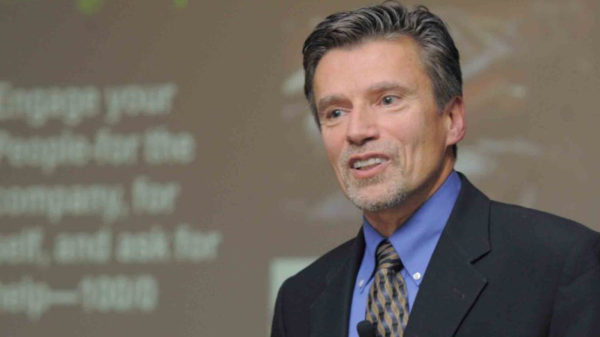
Purpose Revolution: The observer age is dead. We’re in the participant age.
As one great example of that, Seventh Generation, the cleaning products company, they ran an ad a few years ago. They run these kinds of ads frequently full page in New York Times. There’s a bill going through congress to make toxins have to be on the label. You’re not going to buy something that has these toxins. You don’t know it’s there. You may not know. In fact, you can put almost anything in it and it doesn’t have to be on the label. Nothing about the company in the ad except a tiny thing at the bottom. You can see the little red part, the little thing Seventh Generation. It basically said, “We’re trying to get congress to pass this bill. We think the unborn and our children, we as parents have a right to know what’s in the products that we buy, whether they’re harming our families. We can’t do that without your help.”
Communicate Your Purpose
By the way, they measure everything they do at Seventh Generation. They measured the impact of that ad, which by the way, it was an authentic expression of their genuine purpose. They didn’t run this ad to get customers. They ran this ad because they wanted this bill to pass through congress. They measured the impact of this ad. Bigger impact on sales than one year of coupons. One year of discounts across the entire company, less impact on sales than this one campaign. By the way, when earlier people talk about experimenting and fail fast and all of that, you’ve got to do the same thing with your efforts to communicate your purpose. Don’t put one sign across every restaurant in your entire chain, “What it means to be good?” Try ten different signs. What it means to be good? See how your customers respond. Try and engage your customers in some of your do good efforts and watch what works. Again, it must be an authentic thing. In fact, you ought to be like my dog. I had a Golden Retriever for years. He was a mentor to me because every time he went to the door for ten years, every time the doorbell rang, he went to the door even though never once in ten years was it for him.
We have to experiment even with our social good in terms of what engages and communicates to people. Remember that we’re always marketing our purpose, not our company. The other thing we long for and you’ll agree with me, we long for authenticity. We long for something that’s real. One reason Prince Ea’s videos work, I don’t know about you, did you feel that guy is real just watching him? He is real. You read correctly. The interesting thing is it’s easy to pick on them because I’m at the Coke conference. I pick on them even when I’m not at Coke Conference, which was the Pepsi ad with Kendall Jenner, picking up on all the riots and stuff across America and Black Lives Matter. Kendall Jenner gives a coke to the police officer and everyone turns from jeers to cheers. It got routinely pad. It was pulled within a few days. Martin Luther King, Jr.’s granddaughter posted a tweet with her grandfather saying, “If only my grandfather had known about Pepsi, everything would be fine.”
Contrast that with Heineken. If you haven’t seen their building bridges ad, go ahead and watch it. It came out of the United Kingdom. They simply took eight people, in pairs, who had radical differences. One who thought transgender was weird. One who was transgender. One who thought climate change is a bunch of bunk. One who thought it’s the most important issue of our time. One who was an avid, rabid feminist. One who said the place of women is in the home, they ought to stay there. They basically put them in a room. They didn’t know this about each other. They gave them some tasks to do. At the end, they wind up building a bar. They’re then given a beer. The video on the screen shows a video of them talking. They haven’t talked about these issues. The transgender person is saying, “I’m transgender.” The guy she’s been with for the last half hour saying, “It’s weird. It’s an aberration,” and then they’re given a choice. You can leave or you can sit down and have a conversation. They were real people. They weren’t actors and actresses. It went viral. It’s a huge positive impact for Heineken.
It’s obvious to see some of the difference, but here’s the thing. If we’re going to try to market purpose, we better be sincere about it. The second thing is even there, we better experiment. I’m assuming that Pepsi had something good in their head when they did this, but it sure as heck didn’t work. The interesting thing is we want you to market purpose, not your company. You begin to think about, “How do I do that?”The other thing that’s important, remember our team members are the most believable part of our asset. One of the questions as marketing people I would ask you is, “How is your relationship with human resources?” I work a lot in the HR part of the business, activating employees around purpose, activating them around engagement. How do leaders do that? A lot of HR people are not thinking about this element. How do I get our people to understand our story of purpose and to be able to believably communicate that purpose in moments of truth, inside and outside of work? The smartest companies are constantly asking that question.
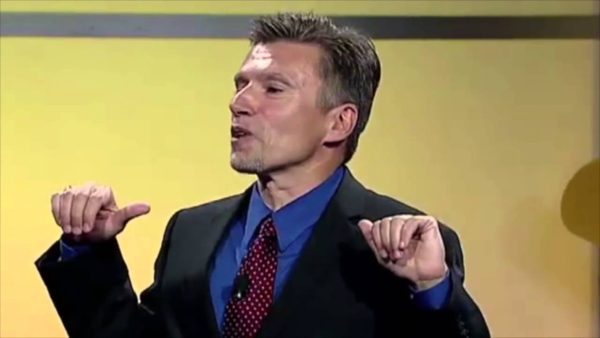
Purpose Revolution: Don’t ever underestimate the power you have as a revolutionary.
Market Your Purpose Inside
In fact, I would say to you, if you have a choice market your purpose more deeply inside before you ever begin to market it outside. I would even go so far as to say, “You don’t have the right to tell the world you’re good and human and think they’re going to believe it. If your team members don’t already believe that and internalize it.” That doesn’t mean that you can’t advertise. You can’t promote the good that you’re doing. I would ask you, “What are you doing to activate that within the organization?”Stories obviously are the magic elixir when it comes to purpose.
One of my clients, Town Shoes, an international division of DSW. Town Shoes, we helped them develop their new purpose, happiness through self-expression. Shoe size is one of those few things that do not change your entire life. I can look around, I can see it here. Each one of you has expressed yourself in your own way through your shoes. This idea of happiness through self-expression. One of the things they did to activate throughout the organization is they started in every meeting in every shoe store asking team members, “How did you get to help people find their happiness and self-expression in your job?” They started communicating those stories through the company and many of them started going viral within the company. They weren’t worried. We’re not trying to tell this to the external customer. We’re trying to do it inside.
There’s one woman who wrote a letter in one of the stores who said, “My daughter is quite obese and it was beginning of school. Every time we go into a shoe store, she’s treated like a second-class citizen. The people serving her make her feel, ‘What difference does it make what shoes you wear?’ In your store today, your associate, she was in tears when she left. You made her feel good about herself that it mattered.” The interesting thing is as those stories have started to accelerate through the company, you can start to literally palpably feel the difference in terms of that purpose growing within the company. Is it showing to customers? You bet it is. They are in the process of earning their right to talk to their customers about that. They haven’t even talked to their customers yet about their purpose because they want to earn the right internally first, to be able to say that we’re human to the outside.
Find Your Own Humanity
I said, as marketers, I believe The Purpose Revolution has also a great opportunity for you to find your own humanity. I know about you, but business has a unique role in solving the greatest problems that we face today. Individuals are as powerful as we are, it’s hard for us aggregately individually to make a big impact on the big issues of our time. The government all over the world is dysfunctional and it’s not this dysfunctional because of the players of the day. It’s dysfunctional because as Tony Blair said, “Solving problems climate change cost something now in the time you’re going to be elected and even though it won’t be solved until after you’re no longer running for office.” All over the world, governments are dysfunctional. Individuals not powerful enough and businesses are being asked to step in to make a difference on some big issues.
The world is aching for us to step into our humanity. Share on XLet me tell about one marketing client of mine who found her own humanity in her company’s purpose. Heineken Mexico is a client of mine. They all run as independent companies. It’s the largest division of Heineken in the world. Dolf van den Brink, the new CEO from the Netherlands originally, goes there. He wants to engage them in exercise. What is our purpose as a company besides to grow our brands? He works for a number of months with the senior team throughout the company and they come up with a simple but powerful purpose to win big for a better Mexico. They say, “We want to grow our brands. We want to be winners and grow our market share, make great beers. We live in a country with so much potential, but there are things holding this country back from achieving its highest potential. We want to win big and in the process create a better Mexico.”
Patricia Corsi, who is the Chief Marketing Officer for Heineken Mexico, said to the rest of the senior team, “If we were serious about that, if we’re serious about creating a better Mexico, Tecate is the man’s beer in Mexico.” They were the ones who ran the girly calendars for years, it’s scantily clad women. She said, “If we were serious about a better Mexico, we would do something about domestic violence.”Three or four Mexican women have been victims of domestic violence. 70% of Mexicans say it’s a part of normal life. They’re not saying it’s good, but it’s a part of normal life. I understand you’re the girly brand, the man’s beer. They said, “We think it’s true. If there’s going to be a better Mexico, something’s got to be done about violence against women and what a better place to do it than if you were the man’s beer.”
They knew people wouldn’t take them seriously if they didn’t do something bold. It started a conversation. There were in fact people who said, “I don’t want to buy your beer anymore.” They said, “That’s okay because we meant it.”They started running a series of ads, social media, and on television saying, “What does it mean to be a mad? Add some that were funny, some were that serious, things like no means no.”They’re trying to redefine masculinity in Mexico, but the interesting thing is what happened for the people inside of Tecate. What happened to the people inside of Heineken Mexico?
The way purpose began to change the conversation, even about men and women in violence within that company of thousands of people. I asked Patricia Corsi, because I knew I was coming here to share that with you. “Patty, what did that mean for you as a Chief Marketing Officer to be involved and continue to be involved in that campaign?” Here’s what she said. She said, “There’s a Latin woman that is also a wife, working mother and breadwinner living in a country where violence against women is often treated as normal, this has allowed me the opportunity to do something big to support the change of culture that I would want to create in the world. Being able to work on such an important matter has given me emotional support in difficult times. Working in a macho-driven country in business, knowing I have the possibility to make a mark bigger than myself, it gives me an extra boost on any bad day and even on good days.” I asked her, “Are you willing to be bold?”Here’s the interesting thing about The Purpose Revolution, we want you to be.
Demonstrate that you have your humanity. Share on XWe want you to demonstrate that you have your humanity. I often think I’m one of the greatest brands of our generation. Almost everyone thinks Apple won the game simply because they had a better product. If you know the story of Apple, it was pretty much a place for geeks in the days when he hired John Sculley to be the CEO. When Steve Jobs came back, he launched the Think Different campaign. When he launched the Think Different campaign, he pretty much said, “Ultimately, marketing is about values. If you know anything about adoption curves, the way you become the middle of the bell curve is when the people at this end of the bell curve and they bring these other people along and that’s exactly what happened at Apple. The people who bought apple in the early days when Steve Jobs came back, they didn’t buy it only because of the product, they bought it because they believed in the values of Apple about thinking differently. You could pick Apple users out on an airplane because they had funnier glasses on. they had funkier shoes on because it was part of their identity. They don’t have to do that anymore.
I would ask you, why would someone buy from you besides your product? What’s the story that I’m coming to when I’m a part of that with you? Let me finally say that each one of us in this room has to ask a question, “What role are we going to play in The Purpose Revolution?” I want to end with this story about this guy. Some of you may know him, some you may not. His name is Ray Anderson. Ray Anderson was the CEO of largest modular carpeting company in the world of Interface Carpeting. They made great carpets, they had great customer service. One day a few sales leaders in the company came to Ray Anderson and said, “Ray, our customers are asking us some different questions. They’re asking us what we do with waste in our factory and whether we have any recycled products. They’re asking what toxins we use in our products. Ray, we don’t know how to answer those questions. If it’s okay with you, we’d like to form a committee for sustainability.”
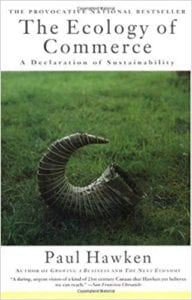
The Ecology of Commerce: A Declaration of Sustainability
Ray Anderson is an empowering CEO. He said, “Go for it boys. Go for it girls. Start the committee.” They said, “Ray, there’s only one catch. We’re going to meet in three weeks. Will you come and share your vision for sustainability for the company at our first meeting?”Ray Anderson, by his own admission said, “I had never given a one thought to sustainability in my entire life until that moment. I had never even thought about it. If they’re going to ask me to present my vision, I guess I better do something.”He went and he started studying the issue. His niece said, “You ought to read this book,” a book by my colleague Paul Hawken called The Ecology of Commerce. The rest is history.
Ray Anderson had his John Replogle moment in the driveway. He realized, “I’m running a successful business and one of the dirtiest businesses in the world. We’ve got to do things different.”Over the next five years, not only did they create technologies like Tesla did that they gave away to the rest of their industry to recycle fibers and reduce waste. Not only are they close to zero waste everywhere in the world. Not only did their stock go up 600% in the five years after those few salespeople went to Ray Anderson and said, “Why don’t we start a committee?”Their employee engagement skyrocketed to one of the most highly engaged companies in the world. The employees became ambassadors. The real moral to the story is it all began because three sales leaders said, “Ray, customers are asking some different questions.”
Don’t ever underestimate the power you have as a revolutionary in this room. The world is aching for us to step into our humanity. Our customers are longing for something real. The problem is they don’t see it and they don’t believe it. If they do, amazing things can happen. Lao Tzu, the great Chinese philosopher once said, “The soft overcomes the hard. Everyone knows it, but few practice it.”One of the greatest challenges of this age of disruption that we’re in is yes, it’s about speed. Yes, it’s about technology. There’s an old school thing that people are longing for. If we can close that gap, just like he did on that mountain in Sicily, maybe a lot of other people with goats standing around us. Maybe we can create some Blue Ocean where you thought there was only Red Ocean. Maybe in the process we’ll solve the biggest problems the world is facing. Give our children and grandchildren a better world than the one we inherited. It’s been an honor to be here. Thank you.
Important Links:
- Dr. John Izzo
- Awakening Corporate Soul
- Values Shift
- The Purpose Revolution
- Amazon.com
- The Ecology of Commerce
About Dr. John Izzo

Dr. John Izzo has been a pioneer on creating successful businesses and emerging work trends for over twenty-five years. Izzo was a pioneer on employee engagement and social responsibility with his book Awakening Corporate Soul (1994), a trail blazer on shifting generational values when he wrote Values Shift-The New Work Ethic (2000), showed how individuals shape the future with Stepping Up (2014) and now is blazing a new trail showing business why a rising class of people worldwide will shape the economy of the future with his forthcoming book The Purpose Revolution. This rising class is not one of nationality, income, race or gender but one that aspires to have a good life while doing good.
He has spoken to over one million people, advised over 500 companies, authored six bestselling books and helped some of the world’s most admired companies. Known for his compelling combination of leading edge research, riveting storytelling, practical ideas to make a difference starting now and a keen sense of where the future is going your organization will leave inspired and ready to act. His clients have included IBM, Qantas, the Mayo Clinic, Verizon, RBC, TELUS, Westjet, DuPont, Humana, Microsoft and McDonalds.
Love the show? Subscribe, rate, review, and share!
Join The Coca-Cola CMO Leadership Summit Podcast community today:
authentricity, communicate our purpose, demonstrate humanity, Dr. John Izzo, marketing our purpose, Purpose Revolution